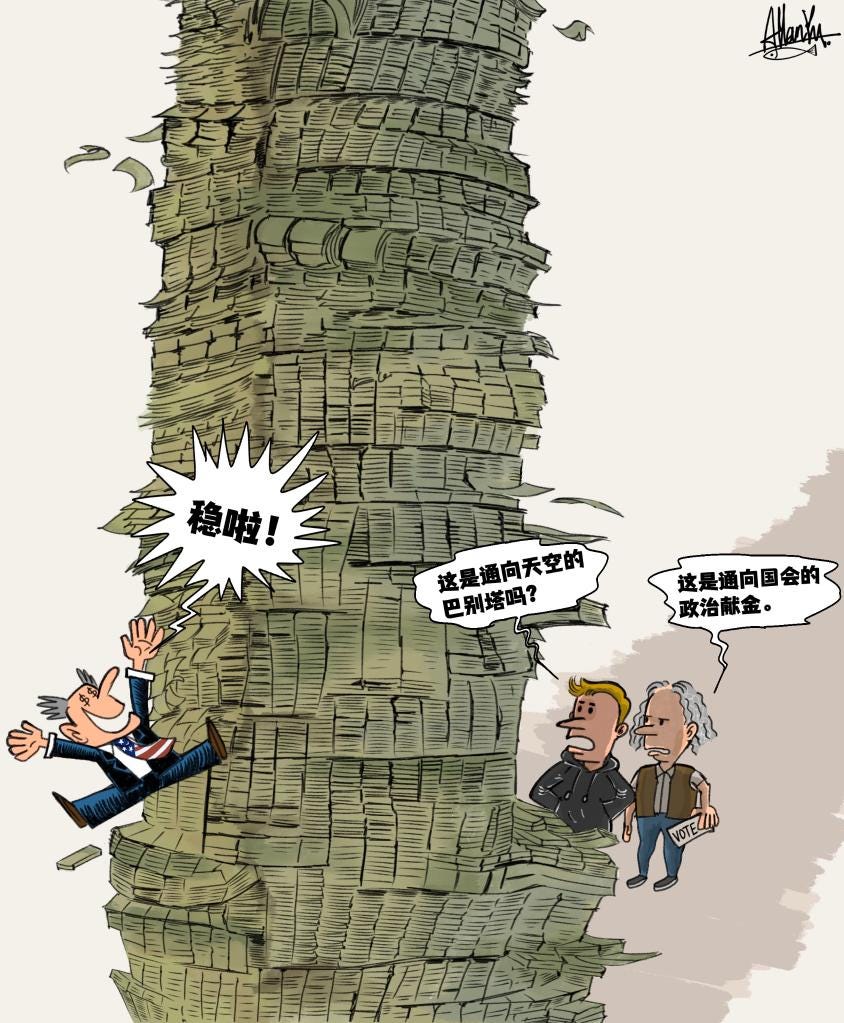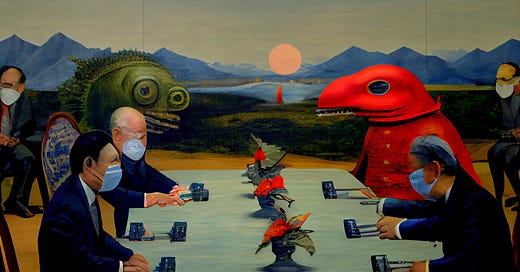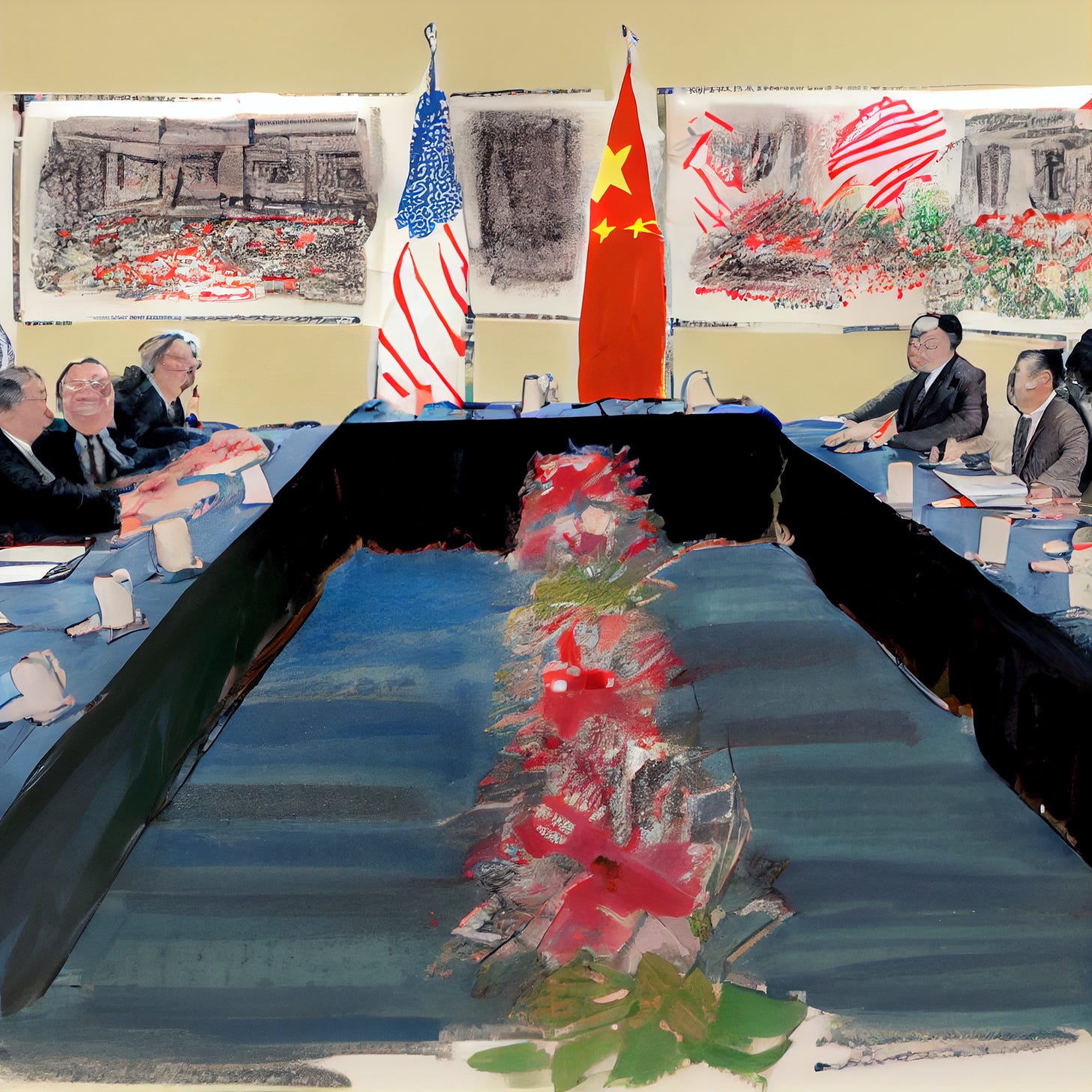Xi-Biden and Midterms through Chinese Media and Elites
“‘American-style’ democracy has fallen off the ‘pedestal of worship’ long before this.”
Xi and Biden’s Indonesia Summit
After Monday’s Xi-Biden meeting, Chinese media has been quite conservative in its messaging, with most outlets barely straying from the official Xinhua readout (and a complete blackout on the uncomfortable Xi-Trudeau chat). The following excerpt from China News, the second largest state news agency after Xinhua, lends some insight into what the Bali trip means domestically:
Throughout this trip, Xi Jinping has been the focal point of the whole summit. Some foreign media has said that world leaders clamoured to speak face-to-face with the leader of the second-largest economy in the world. The almost nonstop arrivals of international heavyweights meant busy itineraries for the Chinese representatives. Some commentators have said that China is evidently taking a “home turf” position at a summit hosted abroad.
…
What will China bring to the world after the 20th Congress? “Opportunity” has become a keyword that Xi Jinping frequently brings up. When meeting French President Macron, Xi said that “[China] will bring new opportunities to countries around the world, including France”; during his meeting with UN Secretary General Guterres, Xi expressed hopes to “bring new opportunities to the world through China’s new development.” Facing Spain’s Prime Minister Sánchez, Xi said that China, in pushing forward with Chinese-style modernization and pursuing high-equality development, will bring new opportunities to countries worldwide, including Spain. “China’s new development means new opportunities for the world” is the message China delivered to the world.
(Bold marks added by the editor.)
As for the spin that some nationalistic commentators managed to add, this excerpt from a viral WeChat article is a good example:
Through observation [of Xi’s conduct at G20], the details reveal a real example of shouldering great responsibility, laying out great blueprints, and harboring great passions, as well as enthralling diplomatic chops and personality. It brings to mind some weighty words China’s leader shared with Biden at a previous video meeting:
“History is just. The actions of a politician, whether positive or negative, will be recorded by history. China believes in actions that reflect our words and impacts that stem from our actions. If we say something, we will do something, and if we cannot do something we will not say so. What matters more than slogans is action…”
Today’s China is not the China of yesteryear. The world faces a major historical pivot. What’s more important is for us to see that the world is neither peaceful nor secure, as Americans make promises on one hand and stir up trouble on another.
What should we do? I’ve always believed that we should still stay calm and confident: calm, as in objectively observing events, and confident, as in believing that time and influence are on our side. As our leader has said before, “as we pursue the project of building new worlds through diligent struggle, we must fundamentally do our own things well.”
China has developed so much already; as long as we keep doing our own things well and share the same heart from top to bottom, why should we be afraid?
(Bold marks added by the editor.)
My full-time employer Rhodium is hiring for a comms position! If you’re interested in China economics/geopolitics and have strong writing skills, consider applying!
The View From Chinese Academia
The following excerpts come from Thomas des Garets Geddes’ excellent Substack Sinification, focused on foreign affairs as viewed from within China.
On US Midterms
Views expressed by Chinese scholars at a recent panel co-hosted by Peking University and Guangdong-based think tank Intellisia (海国图智研究院):
Huang Jing (黄靖) – Director of the Institute of American and Pacific Studies at Shanghai International Studies University
“The Biden administration will gradually lose its rational attitude towards China in order to seek re-election and avoid Republican attacks on Biden for kowtowing to China. With a lame-duck Biden entering the election early, one can expect an increasingly tough attitude towards China over the next two years. This will also establish a model for the next [US] president.”
“Although the future may look grim, there is still room for manoeuvre. First, the Biden administration is a weak administration, with serious factional struggles and an externally strong Republican Party. Therefore, although the [government’s] stance will tend to be clear, its capacity to implement [policies] will be limited. This will continue the current situation of ‘shouting fiercely, but doing little, and getting even less actually done’ [喊的凶,做的少,做到的更少].”
Song Guoyou (宋国友) – Deputy Director of the Centre for American Studies at Fudan University:
“With the Republican Party having now won [a majority in] the House of Representatives: first, the Biden administration has already fallen into a ‘mini lame-duck’ stage and is unlikely to make significant progress on the domestic front. Thus, the focus of the Biden administration could shift to seeking a breakthrough in diplomacy and seeking a diplomatic legacy so as to establish a place for itself in history. Second, the Democratic Party's policy preferences on values and ideology will face more obstacles. The Republicans will adopt a more pragmatic stance on such issues … China needs to seize the opportunity of the summit meeting to help Biden build the diplomatic legacy he wishes to leave behind, particularly by seeking cooperation with the US on the issue of climate change.”
On the Xi-Biden Meeting
Below is a selection of Chinese scholars’ reactions to Monday’s meeting between US president Joe Biden and his Chinese counterpart Xi Jinping on the sidelines of the G20 summit in Bali.
Wang Dong (王栋) – Professor, School of International Relations, Peking University:
“As always, the US has made many commitments, but the key is implementation … Of course, we shouldn't expect too much. After all, the US’s strategic bias against China has already become a fixed mindset. It is not that easy to adjust in the short term … But overall, this meeting between heads of state is committed to finding the right way forward for China-US relations and not allowing the 'spiral of hostility' between China and the US to escalate.”
Diao Daming (刁大明) – Associate Professor, School of International Relations, Renmin University of China:
“[The meeting] was of great significance and its role in helping stabilise relations between the two countries goes without saying … This face-to-face exchange will, to a certain extent, help repair the relationship between the two countries … Strengthening communication in all areas will help to resolve existing problems. The extent to which these problems might be solved will depend on actions, though mainly actions by the US.”
Shen Yi (沈逸) – Professor of international politics and director of the Centre for International Cyberspace Governance at Fudan University:
“Both sides nevertheless reached some agreements … [such as] the need for the diplomatic teams of both sides to maintain strategic communication, conduct regular consultations and normalise exchanges … Dialogue and coordination between [US and Chinese] economy teams on macroeconomic policy, trade and other issues achieved during this meeting between US and Chinese heads of state, can be seen as a significant step forward or a positive sign of progress.”
“There is, of course, reason for limited optimism arising from this meeting. This optimism is reflected by the fact that the US has also finally realised that the issue [of US-China relations] has reached a level where substantial improvements are needed … So how will the future unfold? We can focus on a number of important issues brought up during this meeting, such as the Taiwan issue, and we will have to wait and see whether or not the US’s commitments will be consistent with its actions.”
Chinese Media Covers the Midterms
While the Xi-Biden meeting attracted eyeballs, the 2022 US midterms didn’t exactly make headlines in China. There are a few interesting observations to be made, nonetheless:
One of Chinese nationalists’ main arguments is that electoral democracy is fundamentally inferior due to procedural flaws and wastefulness. The accusations range from reasonable critiques of exorbitant campaign spending to Weibo users who believe Democrats are mass-producing fake ballots.
State media is very focused on political polarization as a cautionary tale. In general, criticism of democracy in China is highly US-centric and often takes aim at “US-style democracy” specifically.
Nancy Pelosi is almost certainly the least popular US politician in China — rare to see her invoked without the misogynistic “old witch” adage these days.
From Foreign Ministry Spokesperson Zhao Lijian’s November 9 press conference:
China Review News: The US held its 2022 midterm elections on November 8 as scheduled, and the election results are coming out. Does the foreign ministry have any comment on this? What’s China’s view of China-US relations after the elections?
Zhao Lijian: I won’t comment on this, as the US midterm elections are its internal affairs, and the election results are to be decided by the US voters. As for China-US relations, our position is consistent and clear. We believe that a sound and steady China-US relationship serves the fundamental interests of the two peoples. It is also the common aspiration of the international community.
The boilerplate public stance, however, did not stop Xinhua from adding commentary, which set the tone for much of Chinese state media’s views on the election. In a widely reprinted op-ed on November 12, two Xinhua reporters discuss how the 2022 midterms were the most expensive ever:
Severe social division is a major factor in the “price inflation” of American elections. Elements like the widening gap between the rich and poor, political polarization, and identity politics contribute to the omnipresence of conflict between interest groups. Legislations on everything from the pandemic and abortion to gun control, infrastructure, and public debt have become partisan battlefields and bargaining chips. … According to a report from NPR, the Democratic Party spent twenty times more on abortion-related ads in 2022 than it did in 2018.
…
Arguably, the more intensely the Democratic and Republican parties play the “money-burning” game, the bigger the “political distance” grows between Americans. A survey from American think tank Pew Center shows that 90% of American respondents believe there are serious differences between supporters of different parties, and nearly 60% of respondents believe that not only do citizens differ on policy issues, they also have little common ground when it comes to recognizing basic truths. [Ed.: Unclear which survey Xinhua is citing here, but Pew’s August 9, 2022 report says that 57% of Americans say there is a great deal of difference between what the two parties stand for. ] In today’s America, “I am an American” is slowly being replaced by “I am a Republican” and “I am a Democrat”.
(Hyperlinks and bold marks added by the editor.)

State media pays attention to an interesting range of internal US affairs. Here’s an excerpt from a story titled “Chaos and Polarization Amid the US Midterms”, published on November 11 in the Central Commission for Discipline and Inspection (CCDI)’s own newspaper, China Discipline Inspection News:
In the morning of November 6, a voting station in Manhattan, New York paused early voting due to a “bomb threat”. The NYPD’s bomb squad was immediately deployed to the site.
On the same day, the campaign headquarters of Kari Lake, the Republican gubernatorial candidate in Arizona, received a piece of mail containing suspicious white powders, forcing Lake to close her headquarters and pause campaigning. Earlier, the election offices in Adams County, Colorado also found a “suspicious, white powdery substance” inside a mailed-in ballot. Local police said that “someone is attempting to disrupt the electoral process.” [Ed.: The author has misrepresented the event here. Josh Zygielbaum, the clerk of Adams County, told ABC News on November 3 that “even if we have individuals who are going to try to disrupt the process, we will work around them to make sure it gets done." The substance was later found to be consistent "with ordinary household cooking materials".]
…
“‘American-style democracy’ has fallen off the ‘pedestal of worship’ long before this.” [Nankai University Professor] Liu Ming tells reporters that in recent elections, expressions of bad-faith competition like “chaotic performances”, “distasteful behaviours”, “hate speech”, and “ad hominem attacks” have proliferated. The attack on the Capitol in 2020 after the presidential election further placed American democracy near the brink of collapse; the Capitol riot almost led to the fundamental demise of American democracy. Biden, at the time, also acknowledged that “American democracy is under unprecedented attack.”
(Bold marks added by the editor.)
Some AI Art
I seeded this photo into Midjourney v4
The following was “official meeting between the US and China, Max Ernst”
Wu Guanzhong:
Audrey Kawasaki:
In a somewhat terrifying twist to close, whenever I tried to get it to make a photo of Xi and Biden shaking hands, the AI kept turning Biden into a Chinese grandpa, though I do think some of these capture Biden’s smile!
Please consider subscribing to ChinaTalk for more news coverage and AI art nightmares.










The giant lizard? Jake Sullivan, I think :-)